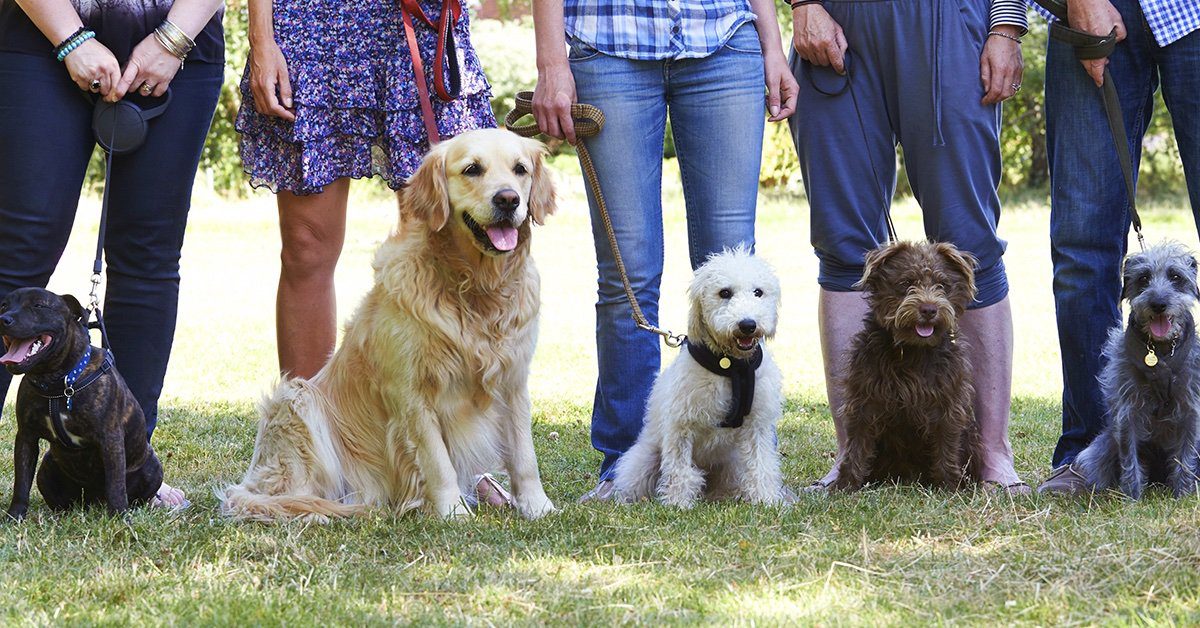Training is an essential part of dog ownership: It helps your pup with socialization, it keeps their mind and body stimulated, and it allows you to build a strong bond that will last for years to come.
Plus, teaching essential commands – sit, down, stay – will help your dog become a well-mannered companion. It may surprise you to learn that according to the American Pet Products Association’s most recent National Pet Owners Survey, only 8% of dog owners report taking their pups to obedience training.
73% of people, however, report using some type of training device or method with their dog, like treats or a clicker, for example.
So, how do you know if group dog training classes are right for you? And how do you find good classes in your area?
This guide is here to help. We’ll walk you through everything you need to know about dog training classes and choosing the right one for you.
Group dog training classes vs. private dog training
Dog training will always involve practice and lessons at home, but you might also consider enrolling your canine companion in a group class – especially if they’re a younger puppy, or you don’t have much experience with dog training yourself.
You have several options when it comes to training your pup, and each has its unique advantages.
Group dog training classes
Group training classes are usually taught by a professional dog trainer and may be held in an indoor or outdoor facility. Classes are often separated by age group, skill level, and training focus – such as those that specialize in loose-leash walking or others that introduce dogs to the basics of agility.
Group training classes can be a good option for new owners, especially those who have never had a dog before. These classes are often taught on a week-to-week basis, which helps both you and your dog build on what you’ve been learning and reinforce each week’s lesson while practicing at home.
In addition, group classes are great for puppies, as they can help with socialization skills. Group puppy classes allow you to expose your dog to new environments, different people, and unfamiliar scenarios – all of which can help your pup develop manners and prevent future anxieties.
Private dog training classes
Group training classes won’t be right for everyone. Reactive dogs, dogs that are easily distracted, or dogs that are extremely nervous, for instance, might not succeed in a group class setting.
Similarly, if you feel intimidated by the idea of training classes with several other dogs and owners, don’t worry – you have other options.
One option you might consider is taking your dog to a training center for a private class. Like group classes, private classes are taught by professional dog trainers and typically held at outdoor or indoor facilities.
Depending on the facility, type of training you’re looking for, and the individual instructor, you may find a week-to-week class (e.g. every Thursday), or a more frequent cadence works better for your needs.
Private training classes at a training center can be a good option if your dog is reactive, shy, or easily distracted – especially when it comes to other dogs – but you still want to work on introducing them to new environments.
In-home dog training classes
If you have a very reactive or shy dog – and you think going to a training school might be too much for them – then you might choose in-home training classes.
Private lessons can be a good option to help you and your dog learn training methods from a professional, while still remaining in a comfortable environment. In-home training can also be a good choice if you have specific behavior issues that you want to address, such as excessive barking or separation anxiety, and want a more personalized lesson.
Many professionals offer private home-based training sessions either on a one-off or regularly scheduled basis. You can talk to a trainer to determine what works best depending on your dog’s training needs and your schedule.
And perhaps, after you and your dog have gone through an at-home training program, you might be ready to consider lessons at a training center.
Types of dog training classes
Now that you have a sense of the differences between group training classes and private training classes, let’s talk about the types of dog training courses that may be available for you and your pup.
If you’re thinking of enrolling in a group class, here are some common options you might find:
Puppy socialization classes
Puppies can usually start attending their first classes as soon as they’ve received their required vaccinations – at about four months old.
Puppy socialization classes will introduce dogs to other people, different objects, and new experiences. These classes will help you learn positive reinforcement strategies and work you through common challenges of puppyhood, like potty training and teething.
Basic puppy training classes
These classes will help you teach your puppy core commands like sit, down, and stay. Some training centers offer the American Kennel Club S.T.A.R. Puppy class – basic manners and socialization program for puppies, this class ends with a short test, and upon passing, you can receive a medal and certificate from the AKC.
Basic obedience/manners classes
Once your dog has graduated from a beginner puppy training class, you’re ready to move to the next level, a basic obedience class, sometimes called a basic manners class.
These classes are also a good option if you’ve just adopted an adult dog, or if your adult dog simply needs a training refresher. Basic dog obedience training usually reviews the commands taught in a puppy class, as well as teaches skills like come, leave it, leash walking, and hand targeting.
Advanced obedience/manners classes
Training schools will likely break down their obedience or manners classes into different levels, but once you’ve taken the basic obedience class, you can move on to other courses.
More advanced level classes will expand on the skills you’ve learned already and help you practice your recall at a distance, teach your dog to lay on a mat, work with distractions, and more.
Canine Good Citizen (CGC)
Similar to S.T.A.R. Puppy, the AKC Canine Good Citizen program is a ten-skill training course that shows your dog’s ability to demonstrate basic manners and obedience. This program is also a prerequisite for many therapy dog programs.
In CGC classes, trainers prepare you and your dog for the ten skills that you’ll need to complete the CGC test at the end of the program. If you pass, you receive a CGC certificate and your dog can add the “CGC” title to their name, if registered with the AKC.
Specialized training classes
After you and your dog have mastered the basics, you might decide to take a more specialized training course. Some of these classes include:
- Dog sports, like agility or scent work
- Tricks
- Therapy dog programs
- Skill/behavior problem specific, like loose leash walking, focus and impulse control, or reactive dog classes
How to find a dog training class in your area
Finding the right dog training class for you and your pup is essential. You want to ensure that you find a local facility that not only offers a suitable course for your training needs, but also one that’s safe, reputable, and makes both you and your dog feel comfortable.
Here are two strategies you can use to find a great dog training center in your area:
Ask for referrals
You might start your search by asking for referrals, relying on professionals or people that you trust. Your veterinarian, for example, may have a training school that they work with, or know of some good options in your area.
Similarly, local pet organizations, such as rescues or other community groups may be able to point you in the direction of a training facility that they know to be reputable and trustworthy.
Finally, if you have friends or family in your area – who have dogs, of course – you might consult your network and see if anyone has had a good experience with training classes. This can also be an effective way to weed out any training classes to stay away from – if someone you know and trust has had a bad experience, it probably isn’t somewhere you want to go either.
Search online!
You can always perform a simple online search to try and find training classes for you and your pup. Depending on the area where you live, you may have a variety of options, or only a few.
Regardless of the number of search results you yield, however, it’s even more important to vet training centers that you find online, in addition to doing so when you visit in-person. And, of course, you can do the same sort of vetting procedures with any type of referral that you receive from a friend, local organization, or even your veterinarian.
That said, as you search for dog training classes online, you’ll want to make sure you read reviews written by other dog owners to see what their experiences have been like. You can consult review sites like Trustpilot, Yelp, as well as Google and Facebook reviews.
You’ll also want to read through the training center’s website and look to see if the facility is affiliated with any local, reputable organization and if the trainers are certified – with an organization like the Certification Council for Professional Dog Trainers, for example.
What to look for in a dog training class
Once you have a training center (or a few) in mind, you’ll want to make sure that it’s a good fit for you and your pup. Before you sign up for a specific training class, you can visit the facility without your dog to meet the trainers and administrators, see what the space looks like, and get a feel for the classes.
This type of visit also gives you the opportunity to ask any questions you may have, especially before bringing your dog into a new and unfamiliar environment.
Here are some things to look for in a dog training class:
- Clean and spacious facility with adequate room for the dogs to move around.
- Vaccine requirements for all dogs.
- Safety policies in place.
- Smaller class sizes.
- Certified trainers.
- Positive reinforcement training techniques used.
Overall, you’ll want to see that the dogs in these classes are having a good time – they have relaxed and happy body language and interact well with the trainers. The trainers should be knowledgeable about dog behavior and work amicably with both owners and pups.
Some red flags, on the other hand, to be on the lookout for include:
- Too many dogs in one class.
- Dogs with nervous body language, or don’t look like they’re having fun.
- A space that is dirty or seems too small.
If at any time, you feel uncomfortable or unsure about something going on in a training class, you should follow your instincts.
And remember, even if a training center is great, but it’s not the right fit for you and your dog, that’s okay! You want to choose the best option for your unique needs.
Use training to keep your pup happy and healthy
Starting training with your dog not only helps them become a well-mannered companion, but it also strengthens your relationship – allowing you to build an even closer bond.
It may take time and effort to decide which type of class is right for you, as well as find the best dog training center in your area, but it will be well worth it for you and your pup.
Dog training is just one way to keep your pup happy and healthy as can be! Getting a pet insurance plan, like Pumpkin’s dog insurance plan, can help you afford the care your canine companion needs when they get sick or hurt.




